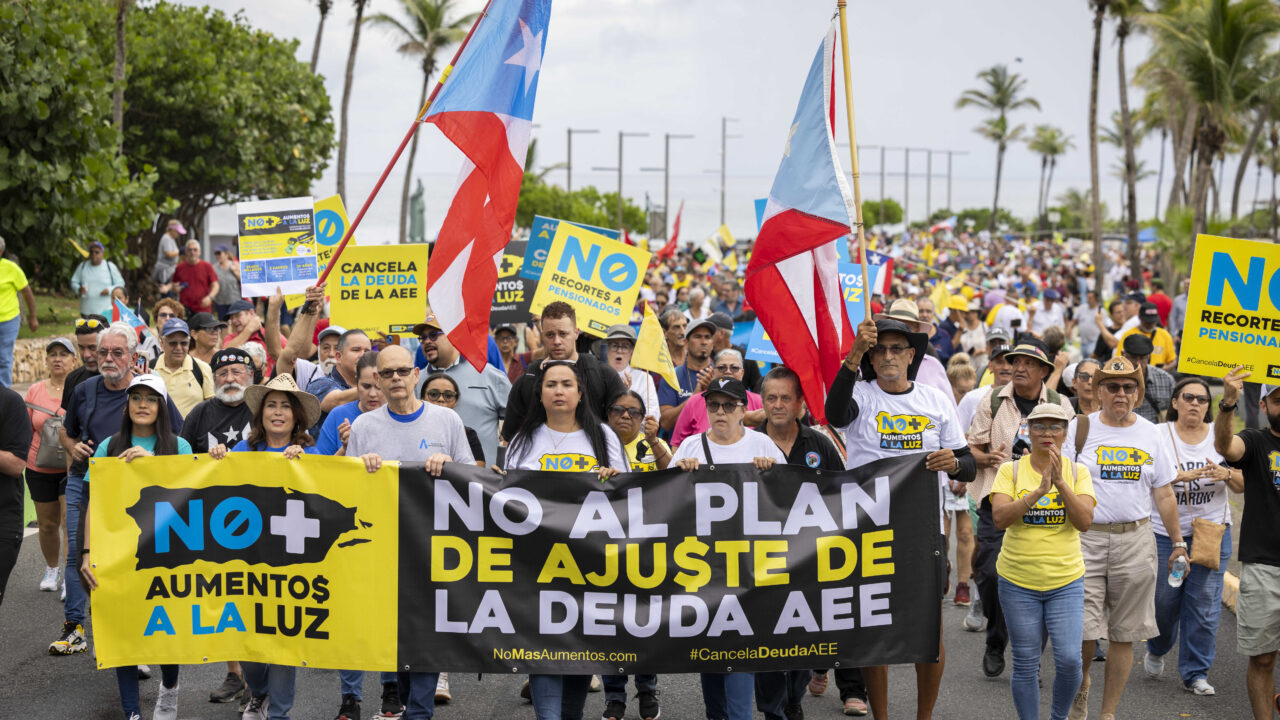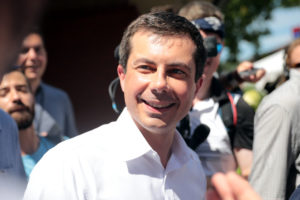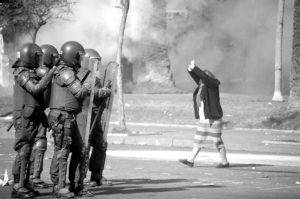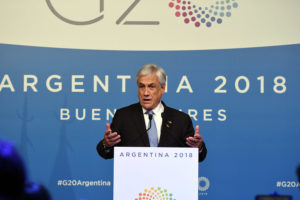‘Bringing Hope to Power’ in Puerto Rico
An historic progressive coalition looks to change the course of politics on the island. People protest in San Juan, Puerto Rico Wednesday, June 28, 2023. Hundreds of people including religious leaders, economists, lawyers, teachers and retirees protested a proposed increase to already high electric bills that a growing number of people in the U.S. territory are struggling to pay. (AP Photo/Alejandro Granadillo)
People protest in San Juan, Puerto Rico Wednesday, June 28, 2023. Hundreds of people including religious leaders, economists, lawyers, teachers and retirees protested a proposed increase to already high electric bills that a growing number of people in the U.S. territory are struggling to pay. (AP Photo/Alejandro Granadillo)
Since the 1960s, Puerto Rican politics has been dominated by the New Progressive Party and the Popular Democratic Party. Despite their names, both have governed from the center and failed to live up to their supposed ideals. Over the last 15 years, their neoliberal policies have triggered a severe economic crisis that they’ve used to justify harsh austerity measures such as the privatization of crucial services like healthcare, education, transportation, highways and electricity. After Hurricane Maria hit in 2017, their response prioritized profits over the well-being of the people, accelerating the staggering loss of a quarter of the island’s population in the last decade due to outmigration.
Understandably, this has led to a profound disillusionment among the Puerto Rican populace towards the two traditional parties. This is reflected in significantly decreased voter turnout over the past decade.
Amid these dire circumstances, the left in Puerto Rico has slowly been gaining traction. A significant turning point arrived in 2020, when the progressive Puerto Rican Independence Party and the emergent Citizen’s Victory Movement garnered approximately one-third of the total vote — just shy of the 33% of the popular vote that reelected Puerto Rico’s sitting-governor, Pedro Pierluisi. This surge in support for the two left parties sparked a question among party leaders: Why not join forces to implement progressive policies and pursue decolonization?
This raises questions about how American allies engage in discussions about decolonization and Puerto Rico’s status, particularly amidst global attention on anti-colonial and self-determination movements.
The idea that these parties might ascend to power was unthinkable just a couple of cycles ago. The CVM began in 2019 as an electoral experiment; until 2020, the PIP’s polling hovered between 2%-5%. But the two parties have joined forces to form a historic juggernaut that, for the first time in Puerto Rico’s modern electoral history, gives two pro-independence leftist candidates a substantial chance at victory.
The crises and dire conditions faced by Puerto Ricans have fueled a genuine yearning for change. Discussion of the CVM-PIP alliance dominates local news, and the rallying cry of “bringing hope to power” — expressing a shared hope for radical change — echoes throughout the growing, overlapping bases of both parties.
The PIP, established in 1946, is a traditional leftist organization that advocates for social democracy and independence. Its support base consists of academics, students and workers across the island’s 78 municipalities, with elected representatives in city councils fostering strong community bases. In contrast, the CVM was born only recently, in 2019. While it also prioritizes decolonization and self-determination, and shares a similar economic and social platform with the PIP, the CVM welcomes varied stances on Puerto Rico’s status. Its base consists of those who prioritize social justice without necessarily aligning with the PIP’s focus on national identity.
The alliance has nominated Juan Dalmau Ramirez from the PIP for governor, and the CVM’s Ana Irma Rivera Lassen for resident commissioner. Both individuals represent diverse sectors within Puerto Rico’s leftist and independence movements, signaling broad agreement on policies and strategy.
For the American Left, this alliance presents a moment for introspection. Two pro-independence leaders from diverse backgrounds now stand as standard-bearers for a newly revived Puerto Rican left. This raises questions about how American allies engage in discussions about decolonization and Puerto Rico’s status, particularly amidst global attention on anti-colonial and self-determination movements. With eleven months until the next election, it’s crucial for concerned progressives in the U.S. to keep an eye on the island and support the efforts of Puerto Ricans bringing hope to power.
Your support matters…Independent journalism is under threat and overshadowed by heavily funded mainstream media.
You can help level the playing field. Become a member.
Your tax-deductible contribution keeps us digging beneath the headlines to give you thought-provoking, investigative reporting and analysis that unearths what's really happening- without compromise.
Give today to support our courageous, independent journalists.






You need to be a supporter to comment.
There are currently no responses to this article.
Be the first to respond.